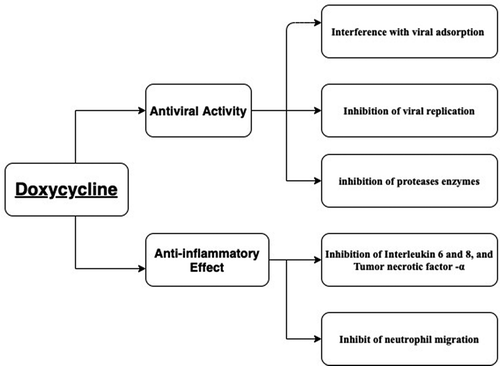Dear Sir,
Coronavirus disease-19 (COVID-19) is a pandemic disease which is caused by SARS-CoV2 virus. It is one of the biggest single-stranded positive-sense RNA viruses. SARS-CoV2 RNA dependent RNA polymerase is an important enzyme for viral replication and transcription and it is considered to be an important therapeutic target [Citation1,Citation2].
Host immunological response against SARS-CoV2 could affect the disease outcome. Patients requiring ICU admission have higher levels of interleukins 6–10, tumor necrosis factor α (TNF-α), and fewer CD4+ and CD8 + T cells. The level of cytokines and lymphopenia are associated with pulmonary damage and respiratory distress [Citation3].
Till now, there is no definitive therapy for COVID-19. Multiple current and investigational drugs are used such as hydroxychloroquine, lopinavir/ritonavir, and remdesivir [Citation1].
Doxycycline is a broad-spectrum antimicrobial that targets bacterial protein synthesis and ribosomes. Many reviews discussed the antiviral role of doxycycline on viruses like dengue virus (DNV), vesicular stomatitis virus (VSV), and chikungunya virus (CHIKV). Doxycycline can achieve its antiviral action through many mechanisms; interference with viral adsorption as in DNV and CHIKV or Inhibition of replication as in VSV. Other studies reported that doxycycline can inhibit DNV and CHIKV proteases; these proteases are involved in the cleavage of viral polyproteins in a close manner to SARS-CoV-2 replication process [Citation4].
Doxycycline has also an anti-inflammatory activity which is achieved through modulation of the expression of interleukins 6 and 8, and TNF-α [Citation5]. It also inhibits the migration of neutrophils to the lungs in mice exposed to intratracheal lipopolysaccharide [Citation6].
Based on previous data, doxycycline could be beneficial in management of SARS-CoV2 through inhibiting viral replication and improving disease outcome through its anti-inflammatory effect ().
A recent study found that doxycycline has an in-vitro effect against SARS-CoV2. It can inhibit SARS-CoV2 replication in a concentration-dependent manner. The EC50 of doxycycline against SARS-CoV-2 indicates weak-moderate antiviral effect so it can't be used as a monotherapy to COVID-19. It is recommended to add hydroxychloroquine to doxycycline for better results [Citation7]. This combined regimen is a known treatment for Coxiella burnetii. It has a good safety profile; therefore, it could be a good substitution to azithromycin and hydroxychloroquine regimen for COVID-19 which may induce cardiovascular mortality due to synergistic effects on QT length [Citation8].
In conclusion, doxycycline is a potent antimicrobial with both antiviral and anti-inflammatory activities. Combined therapy with hydroxychloroquine could be a safe and effective treatment of COVID-19.
References
- Alanagreh L, Alzoughool F, Atoum M. The human coronavirus disease COVID-19: its origin, characteristics, and insights into potential drugs and its mechanisms. Pathogens. 2020;9:331. Available from: https://pubmed.ncbi.nlm.nih.gov/32365466/
- Elfiky AA. SARS-CoV-2 RNA dependent RNA polymerase (RdRp) targeting: an in silico perspective. J Biomol Struct Dyn. 2020;1–9. DOI:10.1080/07391102.2020.1761882
- Pedersen SF, Ho Y-C. SARS-CoV-2: a storm is raging. J Clin Invest. 2020;130(5):2202‐2205. Available from: https://pubmed.ncbi.nlm.nih.gov/32217834/
- D’Alessandro S, Scaccabarozzi D, Signorini L, et al. The use of antimalarial drugs against viral infection. Microorganisms. 2020 Jan 8;8(1):85. Available from: https://pubmed.ncbi.nlm.nih.gov/31936284/
- Conforti C, Giuffrida R, Zalaudek I, et al. Doxycycline, a widely used antibiotic in dermatology with a possible anti-inflammatory action against IL-6 in COVID-19 outbreak [published online ahead of print, 2020 Apr 20]. Dermatol Ther. 2020;e13437. DOI:10.1111/dth.13437
- Farouk A, Salman S. Dapsone and doxycycline could be potential treatment modalities for COVID-19 [published online ahead of print, 2020 Apr 22]. Med Hypotheses. 2020;140:109768.
- Gendrot M, Andreani J, Jardot P, et al. In vitro antiviral activity of Doxycycline against SARS-COV-2. 2020. Available from: https://www.mediterranee-infection.com/in-vitro-antiviral-activity-of-doxycycline-against-sars-cov-2/
- Roden DM, Harrington RA, Poppas A, et al. Considerations for drug interactions on QTc in exploratory COVID-19 (Coronavirus disease 2019) treatment [published online ahead of print, 2020 Apr 8]. Circulation. 2020. Available from: https://pubmed.ncbi.nlm.nih.gov/32267732/

